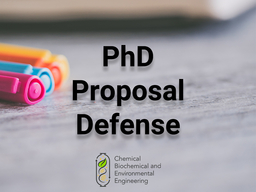Yun Jiao - PhD Proposal Defense
Location
The Commons : 331
Date & Time
February 17, 2020, 3:00 pm – 4:00 pm
Description
PhD Student: Yun Jiao
Advisors: Dr. Greg Szeto and Dr. Jennie Leach
Title:
Delineating immune-mediated mechanisms of disease after traumatic brain injury (TBI) through systemic approaches
Abstract:
Traumatic brain injury (TBI) is one of the most common causes of disabilities and death. However, no therapies have proven therapeutic effects in TBI. The complexity of cellular responses to injury and our poor understanding of their underlying mechanisms makes developing therapies particularly challenging. TBI increases patient risk for chronic neurodegenerative diseases (e.g. Alzheimer’s disease, Parkinson’s disease) and increases susceptibility to systemic infections (e.g. ventilator-associated pneumonia). Persistent neuroinflammation after TBI is one of the major driving forces of chronic neurodegeneration. Although poorly understood, brain injury-induced peripheral immunodeficiency is considered the leading mechanism of susceptibility to infections post-TBI. Overall, TBI alters the local and peripheral immune network, and the immune system is playing a broad role in the recovery following TBI, both locally in the brain and in the periphery. We hypothesize that critical immune-mediated mechanisms underlying TBI can be captured by systemic analyses.
We propose to identify the injury-altered biological pathways in a well-characterized mouse experimental TBI model, controlled cortical impaction (CCI). In order to define local mechanisms in TBI-induced chronic neurodegeneration, hippocampal transcriptomic profiles in chronic injury will be established. Pathway enrichment analysis will be performed to identify the critical biological processes associated with injury-induced changes locally in the brain. Cognitive and motor performance will be correlated with differentially expressed genes to establish a gene signature predictive of neurobehavioral recovery outcomes. This study will expand our knowledge on injury-induced neuroinflammation pathways and identify potential targets for therapeutic intervention. We also propose to identify intracellular and extracellular biomarkers representing peripheral inflammatory dysfunctions causing the immunodeficiency after CCI. RNA-sequencing, flow cytometry and multiplex ELISA will be integrated to analyze the inflammatory cues in circulating blood cells and lymphoid organs. Behavioral scores will be correlated to biomarkers in blood to establish a neurobehavioral recovery prediction model. This study will help us understand the mechanisms underlying brain injury-associated peripheral immunodeficiency and identify potential biomarkers for TBI patient diagnosis and recovery outcome prediction. Microglia, the primary innate immune cells in the brain, have shown to be one of the most important players in the inflammation post-TBI. The survival of microglia depends on colony stimulating factor 1 receptor (CSF1R) signaling. Temporary inhibition of CSF1R results in microglial depletion and repopulation. Delayed microglial depletion and repopulation post-TBI have been shown to result in improved recovery of neurological function. We propose to analyze the changes in microglia induced by injury and repopulation, as well as the microglia-repopulation-mediated changes in other brain immune cell types by transcriptomic analyses. This study will help us understand the mechanisms in the recovery improvement through microglial depletion and repopulation, a clinically feasible treatment approach, and expand our knowledge on the crosstalk between immune cell types in the neuroimmune network following injury.
